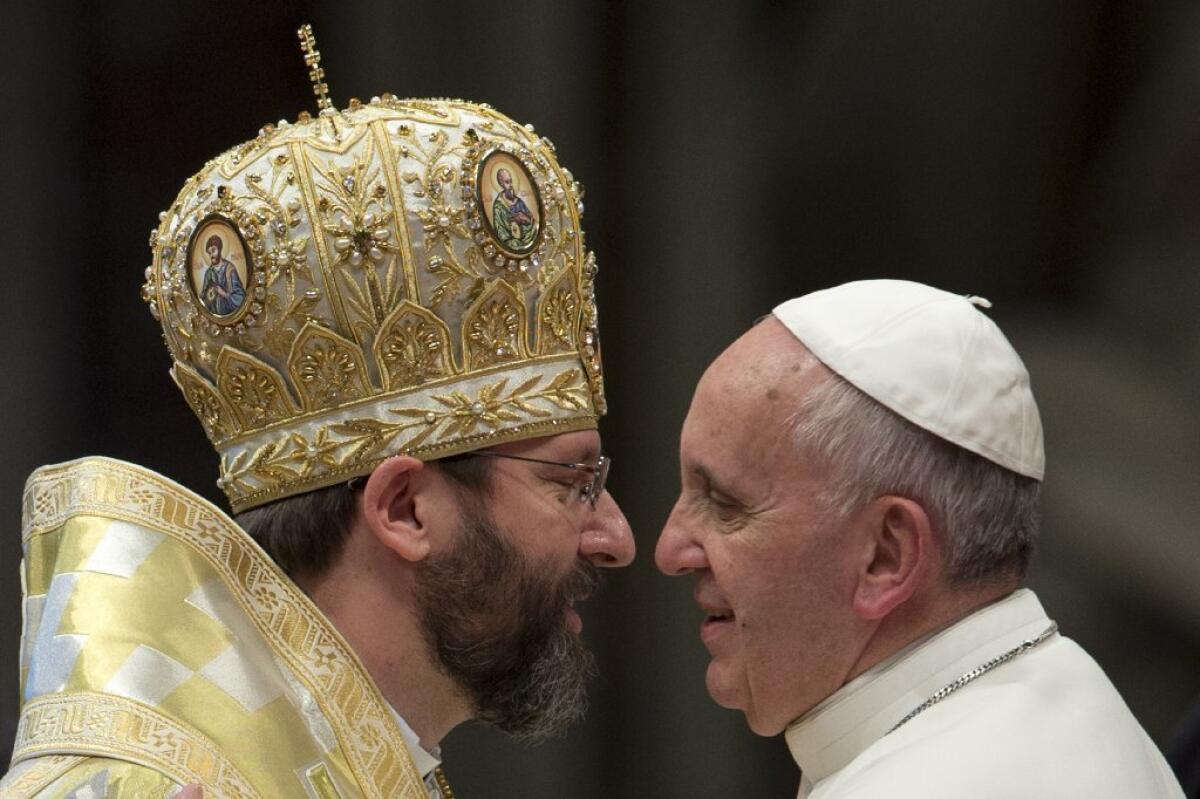Pope Francis can be a player in Ukraine’s identity crisis

- Share via
As pro-Western and pro-Russian Ukrainians battle over the future orientation of their country, there is a world figure who could offer an important symbolic gift to European-minded Ukrainians: Pope Francis.
Stalin supposedly dismissed the importance of the Roman Catholic Church by asking: “How many divisions does the pope have?” But before and after the collapse of the Soviet Union, Russia has kept a wary eye on the Vatican’s activities, particularly in connection with the former Soviet Socialist Republic of Ukraine.
Most Christians in Ukraine are Orthodox Christians, split into three denominations. The Moscow Patriarchate, as the name suggests, is affiliated with the Russian Orthodox Church, and its adherents identify with Russia. But another branch of Orthodox Christianity, the Kyivan Patriarchate, has offered support to demonstrators who want Ukraine to join the European Union. The third Orthodox group is the Ukrainian Autocephalous Orthodox Church.
YEAR IN REVIEW: 10 tips for a better life from The Times’ Op-Ed pages in 2013
But many Ukrainians belong to the Ukrainian Greek Catholic Church, which, though similar to the Orthodox churches in theology, styles of worship and customs (including married priests), recognizes the primacy of the pope in Rome.
The Ukrainian Catholic Church was suppressed by Stalin and its parishes were incorporated into the Orthodox Church. Bishops who didn’t comply were treated as criminals. The head of the church during the Cold War, Archbishop Josyf Slipyj, spent 18 years in Soviet gulags. He was released in 1963 and went into exile in Rome, where he was made a cardinal. He was the inspiration for the protagonist of Morris West’s novel, “Shoes of the Fisherman,” about a Ukrainian pope (made into a movie starring Anthony Quinn).
After the fall of communism, the Ukrainian Greek Catholic Church regained its legal status and started to reclaim parishes and real estate given to the Orthodox by the communists. The revival of the church alarmed Orthodox officials in Ukraine and Russia, as well as the Kremlin. It’s widely accepted that fear of offending Russia has led the Vatican to refuse to recognize Slipyj’s successors as “patriarchs,” a title accorded to the heads of some other Eastern churches in communion with Rome.
Enter Pope Francis. One of the less noted aspects of his papacy has been the respect he has shown to Eastern Catholic churches. Before his inaugural Mass, he prayed at the tomb of St. Peter with the patriarch and major archbishops of those churches. He often refers to himself not as “the pope” but as “bishop of Rome,” a humbler title more congenial to prelates from the Eastern churches.
Francis also has a long history with Eastern Christians; as an archbishop in Argentina, he had responsibility for Eastern Rite Catholics who lacked a bishop of their own. The current head of the Ukrainian Catholics, Major Archbishop Sviatoslav Shevchuk, has called Francis a mentor.
If Francis were to accede to the Ukrainian Catholics’ long-standing request that their leader be recognized as a patriarch, there would be political ripple effects in Ukraine and in Russia.
ALSO:
A budget deal with pain for Republicans and Democrats
Obama’s handshake with Castro: A ‘Casablanca’ moment
Wilderness news of 2013: The good, the bad and the hopeful
More to Read
A cure for the common opinion
Get thought-provoking perspectives with our weekly newsletter.
You may occasionally receive promotional content from the Los Angeles Times.










